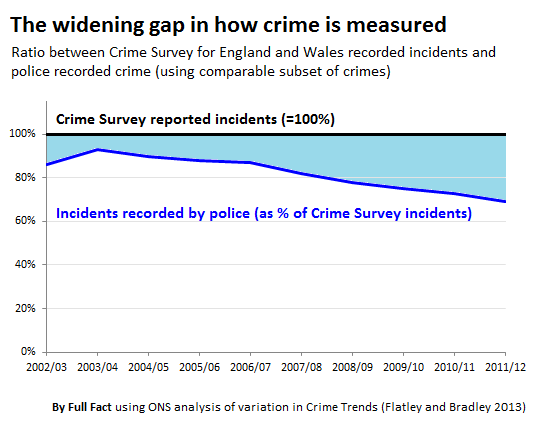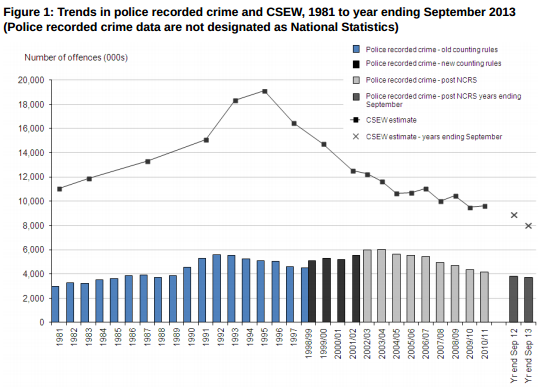Are unreliable police crime statistics concealing rising crime?
And it's falling in spite of police crime figures being stripped of their quality mark by the UK Statistics Authority last month. That's because there are two different measures of crime: the Crime Survey for England and Wales - in which independent statisticians ask people about their own experiences of crime - and crimes recorded by the police.
We can't necessarily draw conclusions from trends shown by police figures, but the Crime Survey has shown a broadly downward trend in crime since the mid-1990s.
But according to Labour's Shadow Minister for Policing in Parliament yesterday, this silver lining comes with a dark cloud:
"there are worrying signs that crime, and especially violent crime, is starting to rise for the first time in nearly two decades.
"... the Government's independent statistics watchdog has said that the statistics can no longer be relied on, and has downgraded its precious gold standard.
"The UK Statistics Authority chair, the eminent Sir Andrew Dilnot, has said that the more accurate the statistics become, the more likely it is that they will show that crime is rising. That is the result of three years of cutting too far and too fast ..."
In fact the UK Statistics Authority was more precise: police recorded crime figures have been downgraded; the Crime Survey retains its quality mark.
In any case, the Minister's last claim doesn't sit easily with what Sir Andrew actually said to Parliament last month:
"It is quite conceivable—indeed, I think it might be quite likely—that if there is proper audit introduced and if the recording of crime is improved, we will see [police] recorded crime increase"
This chimes with recent findings from the Office for National Statistics (ONS), which visualised the growing gap between police crime records and those picked up by the Crime Survey, suggesting that police recording standards may be - for a range of possible reasons - declining.

So if police recording standards do start to improve - it's easy to see how there might be a resulting increase in crimes recorded.
But this would say more about crime measurement than it would about what's happening to crime. And it wouldn't be anything new. In 2002, the National Crime Recording Standard came into being which standardised and aimed to improve the way police record crimes. Recorded crime increased - but crime didn't necessarily increase with it.
Last year recorded sexual offences went up by 17%, bucking the trend compared to other crime measures. But this was partly explained by the 'Yewtree effect', where victims come forward to report historical sexual offences to the police. Again, recorded crime in this area increased - but we don't know whether sex offences actually became more common.
The comments from the Shadow Minister for Policing appear to misunderstand what the head of the UK Statistics Authority said about police crime figures. They may well increase if recording standards improve, but this won't necessarily demonstrate that crime has been rising 'all along' under the Coalition.
